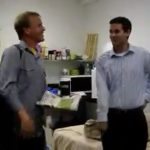As we walked up to Scooter’s on a calm Tuesday evening in the Chicago neighborhood off Paulina, we met with Mary Jane Grinstead, who casually rode up on her bike. Mary Jane is from a small town in Missouri. Over the moderate hustle and bustle of the crowd entering and exiting Scooter’s for their highly acclaimed frozen custard, Mary Jane explained to us why someone would leave a highly paid executive career in technology to write.
 “I always wanted to be a writer as a kid. I went to the University of Missouri and majored in journalism. My plan was to graduate and work for a newspaper or an ad agency.”
“I always wanted to be a writer as a kid. I went to the University of Missouri and majored in journalism. My plan was to graduate and work for a newspaper or an ad agency.”
When she got out of school, she worked for a magazine for a couple of years, but after realizing how little beginning writers actually made, she decided to get her MBA. One afternoon while in her advisor’s office, she was asked to fill an interview slot with the computer giant IBM. Mary Jane agreed, not because she was looking for a job, but just because she wanted to help out. As it would turn out, she had a wonderful interview with IBM. At the time, IBM was looking to hire their first female marketing representatives. Mary Jane fit the role they were looking for.
IBM offered her the job, which she accepted. It sounded like fun and paid considerably more than copywriting. This would prove to be the start of a 15-year career with IBM. She would work in marketing, sales as well as general management. She soon completed her MBA from the University of Chicago. Seeing as how she absolutely loved working for IBM, she never once thought that she wasn’t doing what she had intended to do.
She experienced great success within IBM and advanced to executive management. Eventually she would leave the company however, to join a start-up. From there she moved onto the West Coast high technology company as a senior executive. She had aspirations of becoming President.
But one day it hit her that she wanted to write fiction. She started to attend a writing class on Wednesday nights at the University of Chicago and found herself changing her work and travel schedule, postponing dinners with board of directors and rearranging customer calls in order to attend. As a result, she completely lost interest in her job, forgetting all about her goal of becoming president of a company. She was able to rekindle her love for writing, which had been stored away since she was a child.
Arriving at home one night, she told her husband that she was thinking about quitting her job to write full-time. With his support and after an accumulation of events at work, that’s exactly what she did. It wasn’t that she hated her company or her job, but more that she would much rather write.
“I thought that when I quit that it would be an incredible adjustment. I thought I would miss the phone ringing, the emails, presenting to thousands of people, working with customers and business partners, making plans, running a P&L having an office, a title, and lots of people to delegate to. The amazing thing is that I never once missed any of those things that had been so important to me for so many years.”
Though having published newspaper and magazine articles years before, Mary Jane had never published any fiction before. So, she spent the first year writing poems and short stories. After placing a dozen or so pieces in literary magazines, she spent the second year writing a book without really knowing how to do so. She completed her first fiction book that year and was approached by four New York agents, who were all enthusiastic about her book. She signed with a well-respected agent, who worked hard, but wasn’t able to commit a publisher to the book. So Mary Jane wrote a second book and is even getting started on a third.
In Mary Jane’s words, she started to “get all twisted around her axle” with the publishing process. She had left her secure corporate job to pursue a passion and it was not working out as planned. She didn’t expect to become John Grisham overnight, but she figured that at least she could get her book published, especially when several agents expressed a willingness to represent it.
A friend suggested that she do a little business writing and referred her to a client who needed some marketing materials written. Figuring that it wouldn’t hurt, she decided to give it a try.
She bid on the job at forty dollars an hour, mostly for the experience. She got the assignment and although it wasn’t the fiction novel she had hoped for, it was still writing.
One free-lance job led to another and Mary Jane has turned her business writing into a career which allowed her to make the money she needs to earn while still leaving time for her to work on her fiction. Mary Jane hasn’t given up the goal of writing a novel and having it published. She is, however, enjoying her free-lance work and the comfort of writing. She says that her clients recognize unique benefits in hiring a writer who can combine her business experience in combination with her writing skills.
Here is what Mary Jane had to say looking back on the move she made:
“Leaving business to write full time was a personal thing. It was completely illogical and I certainly didn’t plan for the move financially. In fact it was the opposite of what we (her and her husband) had planned. But I am so happy! Happier than I have ever been.”
Interview
I found myself in this writing class on Wednesday nights. I found myself changing my work schedule, canceling dinners with board members so I could be in that class Wednesday night. I completely lost interest in what I was doing. At this point I was the number 2 person in a $500 million company. My behavior didn’t match my responsibilities. I couldn’t live with the lack of integrity. I didn’t think it was fair to all the people who worked with me to be somewhere.
I went home to my husband and said that I wanted to quit and write full time. He was retired by then. It wasn’t our financial plan at all. I was going to work another ten years. But I quit to write full time.
It wasn’t that I hated my job, it was just became that writing was what I wanted to do.
I spent the first year trying to write short stories and get them published. The second year was spent writing a book. In the first three weeks, I got calls from very respected agents. I signed on with one, and she couldn’t sell my book. To this day she hasn’t been able to sell it. I wrote another one, and she didn’t like it. I wrote another one, and just started getting all twisted.
Barry suggested that I do some business writing. So I bid at $40 an hour. I used to make $3,000 a day. Long story short, one led to another, and I’m now doing $50,000 in business writing. Which is 99% margin, other than my time. It frees up my life to do the fiction. I’m nearly brokenhearted that that book hasn’t been published.
I didn’t plan for it financially. It was the opposite of what we planned. But I’m so happy. When I quit, I thought, ‘Oh my God. That phone’s not going to ring.’ But from the day I quit, I never missed that phone ringing. Ever. I didn’t miss not getting emails. I didn’t miss presenting to thousands of people. I didn’t miss having a nice office or a title or any of that crap. I didn’t miss any of it. But I didn’t think it was going to be easy. I didn’t think it would be easy not having a secretary keeping track of what you have to do that day. I didn’t think it would be easy not having a full calendar with What was very important to me, and what made me happy, was not the same. It’s not the same.
It doesn’t make any sense. It’s completely illogical what I did. Completely. But I’m much happier than I ever was, even when someone was paying me a lot of money. I can’t explain it. But it’s true.
Here’s what happened. The company had paid a lot of money to recruit me in. They thought I came there to run the company. They were flabbergasted when I left.
We had this team building activity and it was just me and this guy. Everything was completely confidential. He said, ‘Your mind isn’t here. What is going on with you?’ I just melted. I started crying in front of him. You know when sometimes it hits you and your eyes get wet? I said, ‘I just want to go write.’ He said, ‘You better make up your mind which hat you’re going to wear. Because if you want it that much, you better go do it.’
It wasn’t that he was the push, but he was part of that paddling. I have no regrets. Yes I was afraid, but I was more afraid of not making quota my first year at IBM. I was more afraid of talking to some of those gorillas at Motorola. They were just Neanderthals. They were many, many things I was more afraid of than this.
I mean there’s nothing more risky…I don’t know, what’s risk? Financially it was extremely risky and is still. But somehow, it all worked out. I left in ’99.
I set a goal for myself. Because writing isn’t the easiest thing to learn. I said that I was going to write 2500 words every day and not leave my desk until I did. It was hard. Some days I could barely get to three hundred words.
I worry now that I don’t know if I’m doing what I’m supposed to be doing. I don’t know if I’m supposed to be writing a fiction book, or if I’m supposed to be building a business around business writing. I don’t know. I know I’m supposed to be writing. I’ve figured that out. But I don’t know if this thing is taking me away from where I should go. To get an agent within the first four weeks and not have a book published? I don’t know what that supposed to mean. There’s some importance to it, but I don’t know if the importance is to keep going. Or to write a fiction book. I just don’t know.
This isn’t a defined path. There’s no defined path for an artist or a writer. There aren’t any rules with this. I’m writing for my clients. A lot of it’s portable. The focus on quality. The understanding of business.
It was an amazingly easy decision for me to leave. When I took that job, it was so not a fit.
You have to write words every day and push opened ended projects that don’t really have checkpoints. You have to create them and push it forward. Someday, it will be done. But you don’t know when.
The biggest challenge is getting published. I want to write, and I want people to read it. I want not only the writing piece of it, but I want to stand up and talk to people about what I wrote. I need a reader. It’s not a closed book for me until I have a reader. Every artist doesn’t need someone to see their painting, but for me, I need a reader.
I have a rule. In the morning the writer and the editor, who is my internal critic, can’t ever come into the room until after 1 o’clock in the afternoon. If you’re a writer, try that. Because the editor tells you how crappy it is. It’s a distraction when you can’t believe you just wrote the last sentence. But if you just turn off the screen to the computer and make it black, and make sure you’re doing the right letters. Then read your writing. You’ll have good sentences. You have to banish the critic.
I do a lot of ghostwriting and editing for people who write. You have to get that critic out of there or you’ll never get it on the page. Plus, you rewrite it eight times. Or ten times. I think it’s hard to get it. My agent gave me plenty of criticism. Plenty. I had to rewrite the whole book.
I didn’t write at all for years when I was at IBM-Motorola. When there was a proposal, I’d volunteer to write it. I always tried to write in my work. I do know that there’s a living to be made as a freelance writer. I think they could easily make well into six figures if you were focused and steady. If I worked as hard at this as I did in corporate America, the same hours, I could do it.
I think I want to write about people who disappear and live whole other lives.
Just write. It doesn’t matter. Get a journal. Even if it’s a blue book. When something comes to you, write it down. Something happens to you as a writer. When you listen to that voice, it will talk to you more often. If you listen to your subconscious, just write it down.
A 300 page book is only 90,000 words. If you wrote 300 words a day, in a year, you have a draft of a book. If you write 2,500 a day, you’ll have a book in 45 days. 2,500 words a day is too much of a day though. But start with 300 words. Even if it’s only ‘I can’t write. I can’t write. I can’t write.’
It’s just like anything else.
I think all of it was necessary. I think you have a path. Some people can stay right on it. I’m not one that I can stay on it.
I don’t really think about it that much. It’s almost like it was someone else. It’s almost like an alien was in my body. I would not accept failure. For myself or for anybody. I was pretty hard on all of us. I think I cared too much about what people thought. I was achieving for some additional reason than my own satisfaction. It was what other people saw. That was a big thing for me. I made decisions so much that way. Which fits into the corporate thing. I made good decisions, the way executives should. Maybe that’s why independent thinkers don’t care so much about the things I used to care for. Maybe that’s why they don’t go into coporate America. Because it doesn’t match.
I think I was more entrepreneurial than I was willing to risk. I do a lot of business writing for entrepreneurial start ups. Sometimes when I’m writing these, I think that I would have love to do that. I would have found one that would have gone. It’s not exactly regret, it’s more recognition of if I came back in my next life, I’d come back and say that this time I’m going to take a lot more risk than I did before.
Even though I quit my job to write, I had health insurance. It’s a risk, but it’s not that kind of risk. When there’s personal satisfaction on the line, it’s not a risk.
I was afraid when the market went south. Playing the whole ‘let’s see what would happen if…’ It’s fear. You can dispel it with facts. Maybe you sell your house and live in a condo, but you’re not going to live on Lakeshore Drive.
When they sent the memo out to the company they had to word it right. Because the CEO didn’t want anyone to know that a person most employees were used to reporting to went to quit to write a book. The memo was that I was retiring, which, I was like 40 something. And it said, ‘Good luck. I would probably be writing the next best seller.’ It set a level of expectation to me. It said, ‘if you’re going to write, you gotta be John Grisham or you’re a failure.’ All that went away.
The people I worked for and with, that gives the company a certain power over the individual. If you care that much about performing to expectations or exceeding them, you give up some personal power.
To the fiction writing, I made my deadlines. I think a lot of writers miss their deadlines. I’m not going to have an accounts receivable problem.
IBM was wonderful. I was one of the first woman executives. As I got greater responsibility, I ran all of the northeast for IBM. It was close to $2 billion and 3,000 people. Sometimes I got tired of being the only woman in the room. Motorola was, even in the 90’s, not as accumentical genderwise. It gets tiring.
When I got my MBA in Chicago, I was one of 5 women in a class of 120.
When I left IBM I was a regional manager. They aren’t very deep. They have seven layers of management, and that’s the first executive level. When I left, I was Senior Vice President immediately after I left. I was in line to compete for the CEO’s title for a much smaller business. A half a billion dollar startup within IBM.






